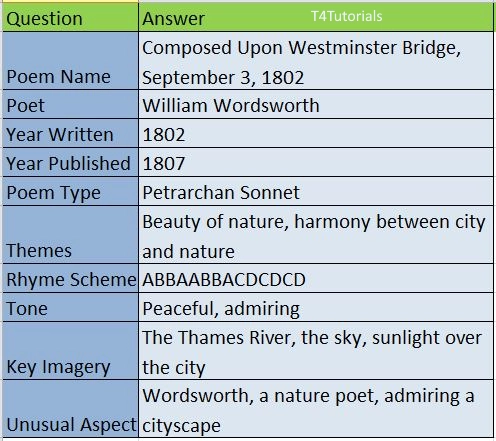Summary:
William Wordsworth’s “Composed Upon Westminster Bridge, September 3, 1802” is a Petrarchan sonnet that captures the poet’s admiration for London in the early morning. Unlike his usual focus on nature, Wordsworth finds unexpected beauty in the city, which appears calm, peaceful, and almost untouched by human activity. The poet describes the Thames River flowing freely and praises the freshness of the morning air. Using personification, he states that “the very houses seem asleep”, emphasizing the city’s rare moment of stillness before the hustle of the day begins. The poem conveys a tone of wonder and admiration, as Wordsworth marvels at the harmony between nature and the city in the tranquil morning light.
| Question | Answer |
| Poem Name | Composed Upon Westminster Bridge, September 3, 1802 |
| Poet | William Wordsworth |
| Year Written | 1802 |
| Year Published | 1807 |
| Poem Type | Petrarchan Sonnet |
| Themes | Beauty of nature, harmony between city and nature |
| Rhyme Scheme | ABBAABBACDCDCD |
| Tone | Peaceful, admiring |
| Key Imagery | The Thames River, the sky, sunlight over the city |
| Unusual Aspect | Wordsworth, a nature poet, admiring a cityscape |
